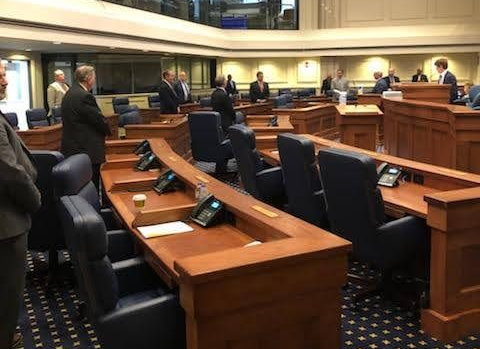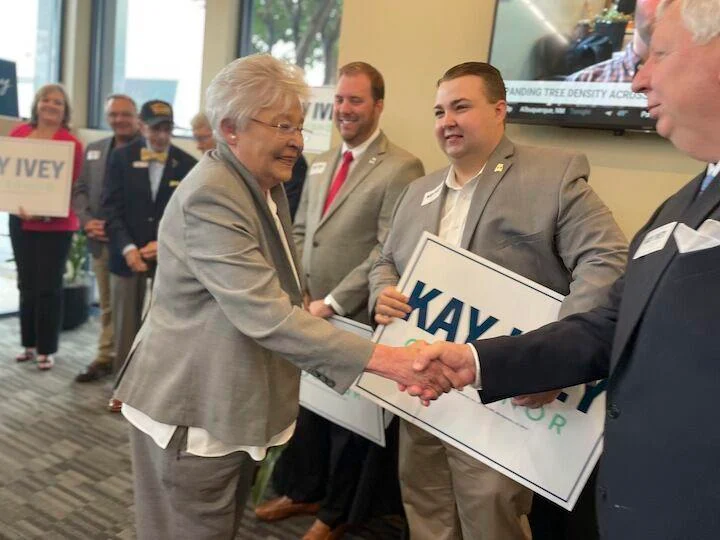Senate confirms University Board of Trustees members

On Wednesday, the Alabama Senate confirmed several Board of trustee members of the University of Alabama, Auburn University, and Troy University just an hour after the nominations sailed through the Senate Confirmations Committee. The full Senate confirmed Businessman William “Billy” Ainsworth’s appointment to the Auburn Board of Trustees. State Sen. Clay Scofield (R-Guntersville) said, “He is a great man and great for the Auburn Board of Trustees.” “I Just want to thank everyone for the support,” Ainsworth told the Confirmation Committee. “I am excited about the opportunity to work with the other trustees.” Scofield said, “I would like to recognize Billy Ainsworth. He is in the office.” The body gave a round of applause to Mr. Ainsworth. Ainsworth is a native of Birmingham and an Auburn alumnus. Ainsworth served as a leader in the steel initiatives industry for over 40 years before retiring from Caterpillar, Inc. as group president of Energy and Transportation in 2020. Ainsworth currently serves on numerous corporate boards, such as Trinity Industries and other civic and charitable organizations and boards. “Mr. Ainsworth represents the best that Auburn has to offer,” said Wayne T. Smith, a trustee member of the constitutionally prescribed Auburn University Trustee Selection Committee, in a statement. “He was nominated for his impressive credentials and ongoing dedication to Auburn University and its students.” The Senate confirmed Robert Dumas’s reappointment to the Auburn Board of Trustees. Dumas is an Auburn alumnus and is the chairman of the Board of directors of Auburn Bank. Dumas served as the bank’s chairman, president and CEO for over two decades until his retirement in 2022. Dumas serves on the boards of the Auburn University Research and Technology Foundation, the Alabama Bankers Association, and the East Alabama Medical Center. The Senate confirmed Jimmy Rane’s reappointment to the Auburn Board of Trustees. Rane is chairman, president and CEO of Great Southern Wood Preserving, Inc. Rane is an Auburn alum. Rane is also president of the Jimmy Rane Foundation, an organization dedicated to providing college scholarships to deserving students. Rane resides in Abbeville, where his company is headquartered. State Sen. Steve Livingston chairs the Confirmation Committee, which meant an hour earlier to consider the nominees. Livingston carried the proposed confirmations on the floor of the Senate. “Both Mr. Rane and Mr. Dumas are in Washington making their pleas for research dollars today,” Livingston said to the Committee. The Senate voted to confirm Jeff Gronberg to the University of Alabama Board of Trustees. Gronberg is a University of Alabama alum. He and his wife, Amy, live in Huntsville. Gronberg has served on the UAH Foundation Board for several years. “Jeff Gronberg possesses strong leadership acumen, as proven by the impressive credentials, awards, and accolades already accumulated in his professional career, and a resolute dedication to the University of Alabama System,” said Board of Trustees President Pro Tempore W. Stancil Starnes. The Senate voted to confirm W. Davis Malone to the University of Alabama Board of Trustees. Mr. Malone is Chairman of the Board and CEO of MidSouth Bancorporation, based in Dothan, Alabama. He is retired from a 30+ year law practice at Farmer & Malone, P.A., in Dothan. He is a 1986 graduate of Cumberland School of Law at Samford University. He is a member of The University of Alabama President’s Cabinet and serves on the Board of Visitors of the Culverhouse College of Commerce and Business Administration, among other boards. The Senate confirmed the nomination of Scott M. Phelps to the University of Alabama Board of Trustees. Phelps is a graduate of Birmingham Southern College and The University of Alabama School of Law. He began his professional career with the Birmingham law firm, then known as Bradley Arant Rose & White, in 1979. He became a partner in 1985. He joined Greene Group Inc. Today and serves as Vice President and Secretary of Greene Group, President of Alabama Reassurance Co., Vice President and Secretary of Alabama Catfish LLC, and Secretary of USA Energy LLC. He helped organize Bryant Bank in 2005 and has been active on the Board as bank Secretary for the last ten years. He is involved in many local and state activities and is a member of the Oversight Committee for the Governor’s Emergency Relief Fund after the April 27, 2011, tornadoes. From 1995-2005 he was an adjunct faculty member at the UA School of Law. The Senate confirmed the nomination of W. Stancil Starnes to the University of Alabama Board of Trustees. Mr. Starnes is the Executive Chairman of ProAssurance Corporation, having served as its Chief Executive Officer from 2007 to 2019. He is a University of Alabama alum and has a law degree from the Cumberland School of Law at Samford University. In 1975, along with his father, he founded and ultimately became the Senior and Managing Partner of the law firm now known as Starnes Davis Florie. He practiced law until 2006, then assumed the position of President, Corporate Planning and Administration with Brasfield and Gorrie LLC. In 2007, he joined ProAssurance. He is a member of a variety of professional and civic organizations. He lives in Birmingham and is a member of the Executive Committee and Board of Directors of the Birmingham Business Alliance. He serves on several other business and charitable Boards. The Senate voted to confirm the nomination of Allen Owen III to the Troy University Board of Trustees. The Senate voted to confirm the nomination of Roy Drinkard to the Troy University Board of Trustees. Drinkard is a 102-year-old Marine Corps veteran of World War II. He is the founder of Drinkard Development. Over 51 years, he has developed retail shopping centers, developing buildings for the General Services Administration, movie theatres, medical complexes, restaurants, and a hospital. The Senate will gavel back in at 10:15 a.m. on Thursday. Thursday will be Day 4 of the 2023 Alabama Regular Legislative Session. To connect with the author of this story or to comment, email brandonmreporter@gmail.com.
Two Shelby County deputies shot in the line of duty Wednesday

On Wednesday, the Shelby County Sheriff’s Department reported on Facebook that two deputies had been shot in the line of duty. “At approximately 9:28 am Shelby County Sheriff’s Office Deputies received a call for a welfare check in the 3100 block of Bradford Place, in the Meadowbrook area of unincorporated Shelby County,” the Department said in a statement. “Upon arrival, deputies observed signs of forced entry. While checking the residence deputies were assaulted with a firearm, and returned fire.” The 31-year-old suspect from Birmingham is in custody at the Shelby County Jail. The suspect surrendered a short time after negotiating with deputies. The wounded deputies were transported to UAB Hospital with serious but non-life-threatening injuries. The Shelby County Major Crimes Task Force is conducting the investigation. Sheriff John Samaniego stated, “I want to thank all the agencies who assisted today during this terrible attack. I ask for the public to pray for our deputies involved today and for all of our brave men and women putting their lives on the line to keep us safe.” “Fortunately, the immediate prognosis is both of them are going to be fine,” Sheriff Samaniego said to the Alabama Media Group. “We can only hope and pray for that.” Please share any information about this with the Shelby County District Attorney’s Office. Alabama Attorney General Steve Marshall told reporters he is grateful that the deputies are OK. “In situations like this, I hope is that reminder to everyone in the community that we need to be thankful and appreciate the risks that law enforcement takes for us every day and their passion in being able to keep us safe,” Marshall said. Law enforcement officers face tremendous personal risks as part of doing their duty. Sixty-one law enforcement officers were killed in the line of duty in 2022. To connect with the author of this story or to comment, email brandonmreporter@gmail.com.
Senate committee advances bill to limit OTC cannabinoids to people over 21

On Wednesday, the Alabama Senate Health Committee voted to advance a bill that would prevent people under 21 from purchasing over-the-counter hemp-derived psychoactive cannabinoid products. Additionally, the bill would impose a five percent tax on all sales of such products. Senate Bill 66 (SB66) is sponsored by State Sen. Tim Melson, who chairs the Senate Health Committee. “I have been getting a lot of calls from parents who get sick at school from these products, and the parents have to come get them,” Melson told Alabama Today. According to the bill synopsis, “Under existing law, hemp and products derived from hemp may be sold at retail in Alabama. This bill would prohibit the sale, distribution, marketing, or possession of psychoactive cannabinoids derived from or found in hemp to any individual under 21 years of age. This bill would also levy a five percent tax on the gross proceeds of the sale of products containing psychoactive cannabinoids.” Alabama Today asked Melson where the new revenue from the tax would go. “The general fund. Since it is a sales tax, it might go to the education fund,” Melson answered. “I would like for it to go to mental health. I need to talk with the Department of Revenue.” The bill defines psychoactive cannabinoids as being “derived from or found in hemp as defined in Section 2-8-381, Code of Alabama 1975, including, but not limited to, delta-8-tetrahydrocannabinol and delta-10-tetrahydrocannabinol.” Delta-9-tetrahydrocannabinol is the cannabinoid that causes the psychoactive properties of marijuana and, as such, is a controlled substance. The cultivation of hemp was legalized in the 2018 farm bill. Hemp historically was grown for its fiber which can be used for rope, paper, car panels, etc. Since cannabidiol (CBD) is derived from hemp, it was legalized as a result of the 2018 farm bill. Delta 8 and Delta 10 are commonly distilled from hemp-derived CBD. Delta 8 is much more psychoactive than CBD; but is only about 25% as potent as Delta 9 (marijuana). In the last two legislative sessions, there have been efforts to outlaw Delta 8 and Delta 10. The state passed legislation, sponsored by Melson, legalizing medical marijuana in 2021. People with a demonstrated medical need will be able to purchase strictly regulated Alabama-grown marijuana by the end of the year. The committee unanimously voted to give SB66 a favorable report. SB66 could be considered by the full Senate as early as Thursday. Thursday will be the fourth legislative day of the 2023 Alabama Regular Legislative Session. The full Senate will convene on Thursday at 10:15 a.m. To connect with the author of this story or to comment, email brandonmreporter@gmail.com.
Danny Garrett addresses some of the misconceptions about state budgets

On Wednesday, Alabama State Rep. Danny Garrett addressed the issue of state taxes and revenue comparisons with other states in a presentation to the House Ways and Means Education Committee – which he chairs. “There is a lot of noise out there that we are a high-tax state,” Garrett said. “The data doesn’t show that.” “Alabama is 49th in per capita taxation,” Chairman Garrett said. “Tennessee is the lowest per capita, but Tennessee has the lottery. If you factor in the lottery, we are 50th.” “You hear people say we are a high tax state,” Garrett stated. “We are not.” Garrett explained that while states like Florida, Texas, and Tennessee have no state income tax (unlike Alabama), they have higher state and local property taxes than Alabama. “We have the lowest per capita property tax in the country,” Garrett said. Garrett said that under the Alabama Constitution, money in both budgets, the education trust fund (ETF) and state general fund (SGF), cannot be used for roads and bridges. Fuel taxes go to the road and bridge fund, raising about $900 million annually. In 2019 the Legislature raised the gas tax for the first time in years. The average Alabamian who drives 15,000 miles a year pays about $215 a year in fuel taxes. $75 of that is from the increase. Garrett explained that total state expenditures counting everything, are about $31.78 billion. Garrett said that income tax comparisons on rates are misleading. “We are the only state that allows you to deduct your federal income tax,” Garrett said. Garrett used the example of Missouri, which has a personal income tax rate of 4.75%, while Alabama has a higher rate of 5%. A person making $100,000 in Missouri would pay $4,750 in state income taxes. Even though Alabama has a 5 percent income tax rate, the taxes paid to the state would typically not be $5,000. After deducting what that person would owe in federal income taxes, the Alabama taxes due would be only $4,108 (less than 4.11%, not 5%). “The state has one of the lowest state sales tax rates at 4%,” Garret said. “The locals have high (sales) tax rates because we limit by law their ability to raise ad valorem rates.” Garrett explained that Alabama has one of the lowest tax rates on cigarettes but one of the very highest excise taxes on hard alcohol. “We are on the high end for tax on spirits and on the low end for cigarette taxes,” Garrett said. Garrett said that over the summer, the Public Affairs Research Council of Alabama (PARCA) compared Alabama’s tax structure with the tax structure of our neighboring states. Using Mississippi’s tax structure, Alabama would have an additional $1.1 billion yearly in state tax revenues. Using Florida’s (even with their not having a state income tax), that state would raise another $1.5 billion in state revenue. Garrett said the state’s high poverty rate impacts state revenues and budgets. Garrett objected to a recent report by the Tax Foundation, which claimed that Alabama is number #41 in the business climate. “If you look at the report, Wyoming is number one,” Garrett said. “They are followed by North Dakota, and next is Alaska. They chose states where nobody lives as having the best climate for doing business.” “To say that we are not a business-friendly state is just not true,” Garrett said. One issue that the Tax Foundation pointed out is the state’s 6.5% corporate tax rate. “To lower the corporate tax rate of 6.5%, you have to go to constitutional amendment,” Garrett explained. “If you look at the incentive package, we are number 1 or number 2,” Garrett added. “The state’s Commerce Department works hard to overcome that (the high corporate tax rate). Some say we don’t need those incentives, but that is not how the world works.” Garrett said that there have been calls by some to eliminate the income tax but pointed out that those states have much higher property taxes than Alabama. “In today’s environment, a lot of people are trying to move away from income taxes,” Garrett said. “We are income tax dependent. Income tax is 65% of the education budget.” “Every state that has a high property tax rate has been enjoying a windfall recently because property values have gone up, so when they come in and reassess, more revenue comes in,” Garrett said. “We are already one of the lowest tax states in the country,” Poverty is one factor responsible for Alabama’s low per capita tax collections. “We are a state with one of the higher poverty rate states in the country,” Garrett said. State Rep. Debbie Wood said, “A lot of time, people are pointing their fingers at us, but local governments can raise taxes too. When we look at gambling, we need to look at all options with an open mind,” Wood said. One contributor to that poverty is the state’s low labor force participation rate. While the state has record low unemployment of about 2.7%, the labor force participation rate is just 56.7%. The U.S. Labor Force Participation Rate is 62.4%. Currently, 43.3% of Alabamians 16 and up are not working. Many of these are able-bodied and capable of working but have not worked in years and aren’t looking for work, so they don’t count as unemployed. “If we just got to the national average, it would be huge,” Garrett told Alabama Today. “It would be a sea change. The question is, how do we get there? Part of that is education. Part of that is getting people off of the programs that are keeping them out of the workforce. Part of that is focusing on areas of the state that are behind.” The Ways and Means Education Committee is tasked with preparing the education trust fund budget. Thursday will be day four of the 2023 Alabama Regular Legislative Session. To connect with the author of this story or to comment, email brandonmreporter@gmail.com.
House committee advances bill to overhaul Alabama’s adoption laws

On Wednesday, the Alabama House Children and Seniors Advocacy Committee gave a favorable report to a bill to replace Alabama’s existing adoption statutes with new code language that sponsors claim will make the adoption process faster, less burdensome, and more affordable. House Bill 101 (HB101) is sponsored by State Representative Ginny Shaver, who Chairs the committee. “This a Law Institute (ALI) bill,” Shaver said. “I started working on a bill and found out that they already had a committee working on rewriting the state’s adoption code.” “The committee has worked for over four years,” Shaver explained, “The Committee has brought in stakeholders from all over the adoption field.” “I started working with the committee in 2021, not to write the bill, but to learn,” Shaver said. “Alabama’s adoption law has not been touched in 30 years.” Shaver said the rewritten 80-page bill “is very comprehensive and detailed.” “The goal was to update the language and streamline the process and protect the confidentiality of the parties,” said Shaver. “To put it as simply as I can, this bill repeals that current adoption code and replaces it.” Shaver said that the new legislation divided minor adoptions versus adult adoptions. It also clarifies which court is the proper court, allows courts handling adoptions to work together and communicate, allows for electronic communication, provides rules for a contest of adoptions in certain situations, and clarifies procedures about relatives and stepparents who adopt a minor. “My concern about adoption is to make it simpler and also to save time and money,” Shaver said. “We want to do everything possible to get a child into a permanent home as soon as possible.” “This streamlines the process and provides clarity to make it better going forward,” Shaver said. State Rep. Barbara Boyd said, “When you are changing codes, you really don’t know what we are voting on unless you are an attorney. I read the whole bill, but I still don’t understand it. In my opinion, it is not a good job.” “We did have a summary, and the Law Institute did provide answers to questions after each section,” Shaver said. State Rep. Randall Shedd, “I want to thank you for your work. A lot of people worked hard on this bill. It may not be a perfect bill, but it is real close to it.” State Rep. Barbara Drummond told reporters at a minority caucus press event afterward, “This bill is a Law Institute bill that overhauls the whole code on adoption.” The committee voted to give HB101 bill a favorable report as amended. The committee also voted to give a favorable report to House Bill 103 (HB103), which is sponsored by State Rep. Allen Baker. “This is an adoption-related bill,” Baker said. “This bill would authorize sick leave for state employees to deal with issues related to adoption.” Boyd asked, “How does this bill differ from current law?” “This clarifies more than changes,” Baker said. “This adds clarity. To this point, this has been up to the discretion of the agency.” Drummond asked, “Is higher ed in there?” Baker said the community college system and four-year higher education institutions were included. Two technical amendments were approved by the committee. HB103 received a favorable report from the Committee in a unanimous vote. Both HB101 and HB103 could be considered by the full House of Representatives as early as Thursday. Thursday will be day four of the 2023 Alabama Regular Legislative Session. Regular sessions are limited to no more than thirty legislative days. To connect with the author of this story or to comment, email brandonmreporter@gmail.com.
Alabama bill would limit prison release for good behavior

Incentives for some Alabama prisoners to follow the rules in order to secure an early release would be restricted under legislation that advanced in the state Senate on Wednesday. The bill slashes the amount of “good time” inmates can receive and also says inmates who commit certain offenses while in prison, including escape and sexual assault, would forfeit all of their accrued time and would be prohibited from earning any more. The Alabama Senate Judiciary Committee voted 9-4 on Wednesday to advance the bill to the full Alabama Senate, which could be voted on as soon as Thursday. Some lawmakers argued that although changes are needed, the legislation is an overcorrection and would worsen the crowded conditions in the state’s prison. About 12% of state prisoners are now eligible for “good time” incentives. Certain inmates sentenced to 15 years or fewer can earn up to 75 days of credit for every 30 days of good behavior. The bill is named after Brad Johnson, a sheriff’s deputy in Bibb County who was shot and killed in 2022. Austin Hall, the man accused of killing Johnson and shooting another deputy, had been released early from prison under good time incentives, despite escaping from a work release center in 2019. Hall served less than four years of a nearly 10-year sentence for theft, according to state records. “His killer should have been behind bars,” said the bill’s sponsor, Sen. April Weaver. The Republican from Brierfield addressed the committee while holding a photo of the slain deputy. Johnson was shot not far from Weaver’s driveway, and the senator’s husband, an emergency room physician, rushed to try to save him. Democratic Sen. Rodger Smitherman of Birmingham said good behavior incentives encourage prisoners to follow orders — otherwise, they “would have nothing to lose.” “This bill is going considerably overboard to address an individual problem we need to look at and correct,” Smitherman said. The committee rejected a suggestion by Republican Sen. Greg Albritton of Atmore to delay the implementation date. Albritton said most prisons consist of crowded dormitory-style housing in which inmates sleep in large open rooms filled with beds. “We don’t have room for people,” Albritton said. Hall, the suspect in the deputy’s shooting, could have had his good time credit revoked for the 2019 escape, but he never returned to state custody afterward, the Corrections Department said in an email last year. Instead, he was held in local jails and eventually released on bond. He has been charged with capital murder for Johnson’s killing and is being held without bond. Gov. Kay Ivey issued an executive order in January putting uniform rules on the use of good time and seeking better communication among law enforcement agencies. Republished with the permission of The Associated Press.
Gov. Kay Ivey outlines priorities in budget recommendation

Alabama Gov. Kay Ivey’s $18.56 billion budget proposal for fiscal 2024 is only $25.6 million less than the total requested by state agencies. The second-term Republican governor’s proposal is a 5.86% increase from fiscal year 2023, when the state’s appropriations added up to $17.5 billion. Download PDF Ivey also wants increases in the state’s education spending, with $349.9 million in additional K-12 outlays (6.22% increase over 2023) and $135.9 million for higher education, growth of 6.42%. Download PDF “Alabama, especially considering the state of the nation’s economy, is on sound footing,” Ivey said in a news release. “Our budgets are strong, and that is, no doubt, because of the fiscally conservative approach we have taken and continue to take. Just as every Alabama family budgets to invest, pay their debts and increase their savings, my budget proposals do just that for our state. “From returning our taxpayers’ hard-earned dollars back to them to making historic investments in our students’ education, these budgets will help foster a strong Alabama today and a stronger Alabama tomorrow.” Among the biggest cuts in Ivey’s budget proposal include: In addition to education, the biggest increases include: Republished with the permission of The Center Square.


